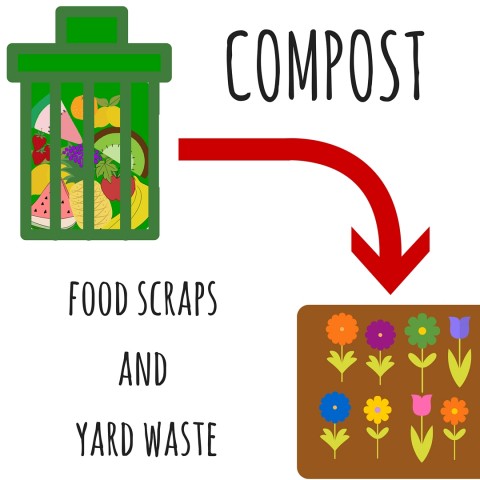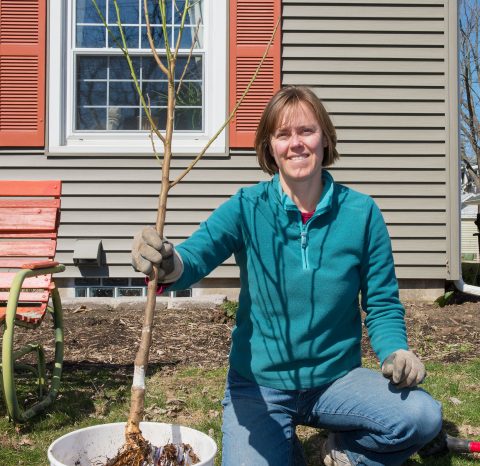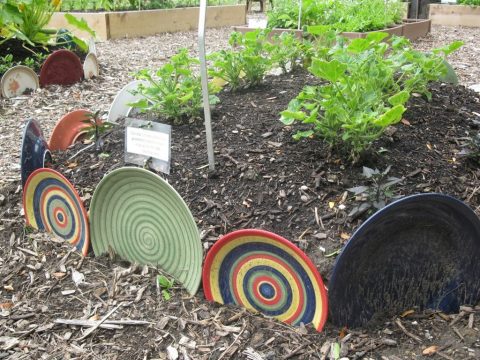Tag: sustainability
Beyond the Game: Emily’s Sustainability Story
Past players of the Cool Choices game-based sustainability program continue to make green choices in their everyday lives even after the program ends. We are always impressed to learn how participating in Cool Choices impacts individuals and their decisions to take further sustainable actions. This month we were inspired by Emily’s story!
What green activities have you been up to since taking part in the Cool Choices program?
I have started my own edible landscaping business. I am encouraging people to plant more pollinator-friendly, edible, and native plants.
What tips do you have for others trying to be sustainable?
Just plant something! The best way to learn is by doing, so get growing!
Emily took part in the 2015 City Wide Cool Choices game in Madison, WI.
Cool Choices Tip: Compost Food Scraps & Yard Waste
 Experts estimate that about 25% of your trash is organic material that can be composted.
Experts estimate that about 25% of your trash is organic material that can be composted.
If you eat lots of fruits and veggies, you could even have more! With the right information, composting can be a simple, yet important, step you can take to be more green.
Check out these links for more composting information:
Beyond the Game: Jeanne’s Sustainability Story
Cool Choices alumni continue to inspire us with the sustainability actions they’ve taken since taking part in our program. This month we were impressed by Jeanne’s story of how her office has taken green to the next level!
What green activities have you been up to since taking part in the Cool Choices program?
In our display garden outside our office we repurposed household items for use in the garden. Old plates were purchased at the local resale shop & used to edge raised beds; used hangers from the same resale shop were wired together to create a trellis; an old rattan chair frame was used for a container garden.
Do you have any tips for others trying to be sustainable?
Purchasing items from resale shops (which usually are run by nonprofit organizations) helps out the community. With a little bit of creativity, these inexpensive items can find a new purpose. It’s a great way to be sustainable.
Jeanne took part in the Cool Choices online sustainability game in 2013 with UW Extension. Inspire by Jeanne’s story? You can make a difference too! Cool Choices is creating a new platform, Connected, where Cool Choices alumni can inspire others by sharing their sustainability stories. More details coming soon!
City of Madison Enlists Cool Choices to Reduce Energy Use
Did you know entire communities are playing Cool Choices to mobilize around sustainability initiatives?
 Recently, Green Madison launched a city-wide game of Cool Choices in Madison, Wisconsin. Residents and employees from more than 40 Madison businesses and organizations such as UW Health, American Family Insurance, MG&E, TDS Telecom, and the Greater Madison Chamber of Commerce are taking part. The Cool Choices game calculates carbon and energy savings as players log their sustainable actions on a daily basis.
Recently, Green Madison launched a city-wide game of Cool Choices in Madison, Wisconsin. Residents and employees from more than 40 Madison businesses and organizations such as UW Health, American Family Insurance, MG&E, TDS Telecom, and the Greater Madison Chamber of Commerce are taking part. The Cool Choices game calculates carbon and energy savings as players log their sustainable actions on a daily basis.
Everyone’s efforts in the city-wide Cool Choices game count toward Madison’s entry in the Georgetown University Energy competition.
 “Madison has a secret weapon in the nation-wide Energy Prize: A game-based-impact approach that inspires and unites every Madisonian around sustainability! Cool Choices has demonstrated results, and will let residents and employees from businesses large and small communicate with each other on how to improve our city,” said Dan White, CEO at Filament Games.
“Madison has a secret weapon in the nation-wide Energy Prize: A game-based-impact approach that inspires and unites every Madisonian around sustainability! Cool Choices has demonstrated results, and will let residents and employees from businesses large and small communicate with each other on how to improve our city,” said Dan White, CEO at Filament Games.
The “social stream” within the game platform promotes awareness of additional Green Madison initiatives designed to help Madison residents save money.
“Employees at Reynolds Transfer & Storage are taking part in the city-wide game of Cool Choices because we see this as an easy and fun way to be more green and to help Madison reduce our energy use as we compete for the Georgetown University Energy Prize” said Benjamin Reynolds, Director of Operations at Reynolds Transfer & Storage. “We hope even more businesses and Madison residents will join in and take part.”
It’s Not Me, It’s You | Making Sustainability Visible
There has been some hand wringing in recent days regarding findings from the National Geographic’s annual Greendex survey. Commentators read the survey and bemoan that Americans are not only more wasteful than their peers around the world, but we also don’t feel guilty about that waste.
Reading the survey results I see a slightly different explanation.
Greendex is a measure of consumer attitudes and opinions, as well as practices. Across four categories of consumer behavior (housing, transportation, food and consumption of goods), Americans ranked dead last, meaning our behaviors have greater environmental impacts than the parallel behaviors of our peers in any of the other 17 countries surveyed.
That ranking is no surprise. Our suburban, car-oriented culture is resource intensive and the US has ranked last each year since the survey began in 2008.
What seems discouraging is that just 21% of US respondents feel guilty about their environmental footprint, compared to higher percentages in other countries like India and China where people have lower footprints. The spin has been that we’re wasteful and that we don’t care.
Looking at some of the other findings here—consistent with other recent surveys—I think there is another story. In the Greendex survey 52% of Americans described themselves as green. So more than half of us think we are doing our part. At the same time these same US respondents said only 35% of all Americans are green.
That means that if there’s a problem in the US, it’s not me it’s you.
This is consistent with the recent AP-NORC survey on energy use and attitudes where only 9% of respondents thought their usage was higher than others in their community—9%. The rest split pretty evenly between reporting they were average or that their usage was below average.
The problem is that we are confident that we are not the problem.
Cool Choices sees this phenomenon in our work inside corporate communities. When we do baseline surveys the majority of employees report that they are doing their part to be sustainable. When asked what portion of their coworkers share this commitment the numbers drop. Indeed, the Greendex numbers look pretty consistent with what we have seen.
And this is a problem. Actually it is multiple problems.
- First, the perception that I’m the only one trying gives me license to try less hard going forward. This is the ‘I’ve already done my part’ phenomena that George Marshall and others cite.
- More importantly, though, the sense that I’m in the minority has huge implications for social norms. If I think most of my colleagues do not care about sustainability then I’m less likely to speak up when I see opportunities.
- And, of course, I will feel less guilty about my overall impact—because it is not as big as the impacts of others around me.
Making sustainability efforts more visible—giving people proof that those around them are also trying to do the right thing—achieves multiple objectives. It busts open the myth that I’m the only one who cares and it puts my current efforts (which might not be as green as I want to think) in context with the actions of my peers, ideally spurring me to do more.
Cool Choices achieves visibility through game systems that are transparent—so that players can see what actions other players have claimed. How can you enhance the visibility of sustainable actions in your work?



